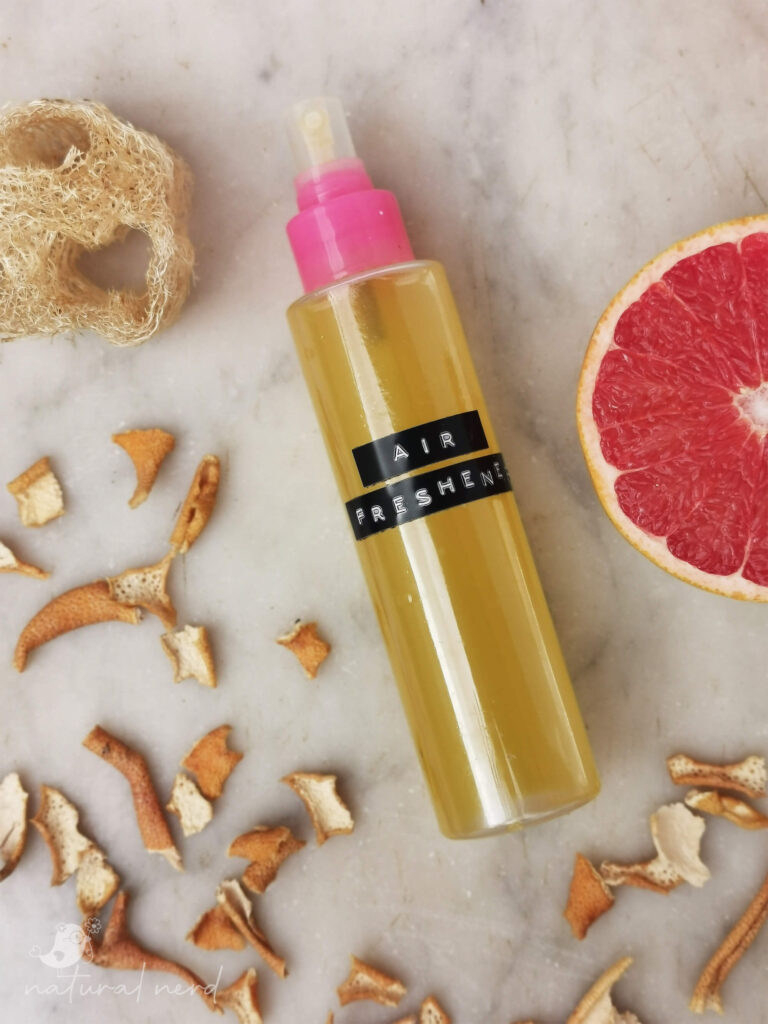
This is my go-to bathroom spray. It is ideal for beginners, because it doesn’t require the extra admin (and cost) that comes with preservatives and solubilisers. This plant-based room spray delivers an uplifting and cheerful freshness to your home with a zesty combination of citrus peels, juice and essential oils – which is rounded off with a sweet hint of vanilla.
Citrus Burst Room Spray
Ingredients
For The Bathroom Spray:
- 80g Citrus Tincture (see below)
- 10g Fragrance Blend (see below)
- 10g Distilled Water
For The Fragrance Blend:
- 10g Ethanol 95%
- 2.5g Citrus essential oils
- 0.5g Vanilla absolute oil (substitute: vanilla extract)
For The Citrus Tincture:
- 75g Ethanol 95%
- 20g Citrus peels
- 5g Fresh citrus juice
Instructions
- Makes 100g.
- Make the citrus tincture: About 1 week before you make the room spray, you will first need to make the citrus tincture. Using sterilised equipment, make the citrus tincture by pouring the ethanol over clean citrus peels & juice in a sterilised glass jar. Close the jar with a sterilised lid, and let it infuse for 1 week away from direct sunlight.
- After 1 week, strain the tincture through coffee filter paper or a fine cheese cloth into a sterilised glass container for permanent storage up to 1 year.
- Make the fragrance blend: In a tot glass or small bowl (not plastic), combine your citrus essential oils and the vanilla.
- Add 10g ethanol to this fragrance blend.
- Cover the fragrance blend securely with a lid or foil to prevent evaporation, and let this fragrance sit for a minimum of 1 hour. This time is necessary to allow the alcohol to dissolve the essential oils, which prevents separated layers in your spray.
- Make the room spray: After at least 1 hour, thoroughly combine the citrus tincture and fragrance blend. Stir well.
- Top up with the distilled water.
- Transfer into a sterilised spray bottle, and use within 1 year.
- To use: Spray away from yourself and avoid inhaling the mist directly. For longer lasting fragrance, spray onto fabrics inside the room like towels and curtains.
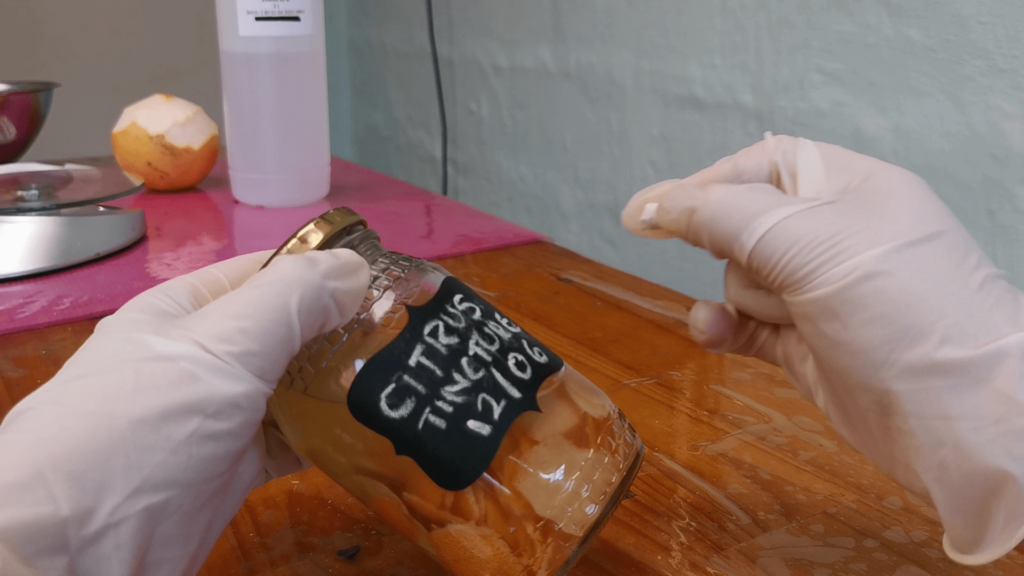
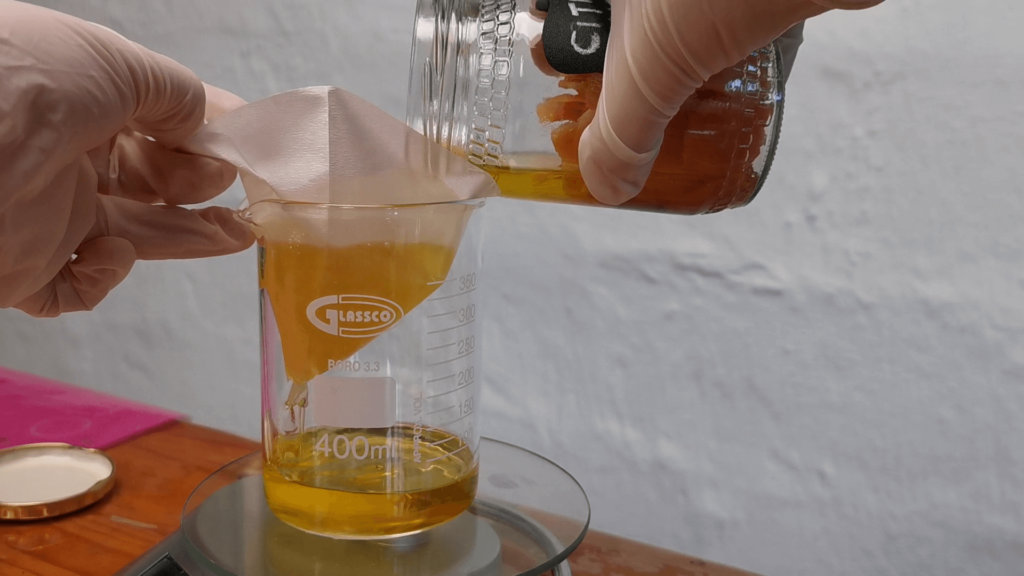
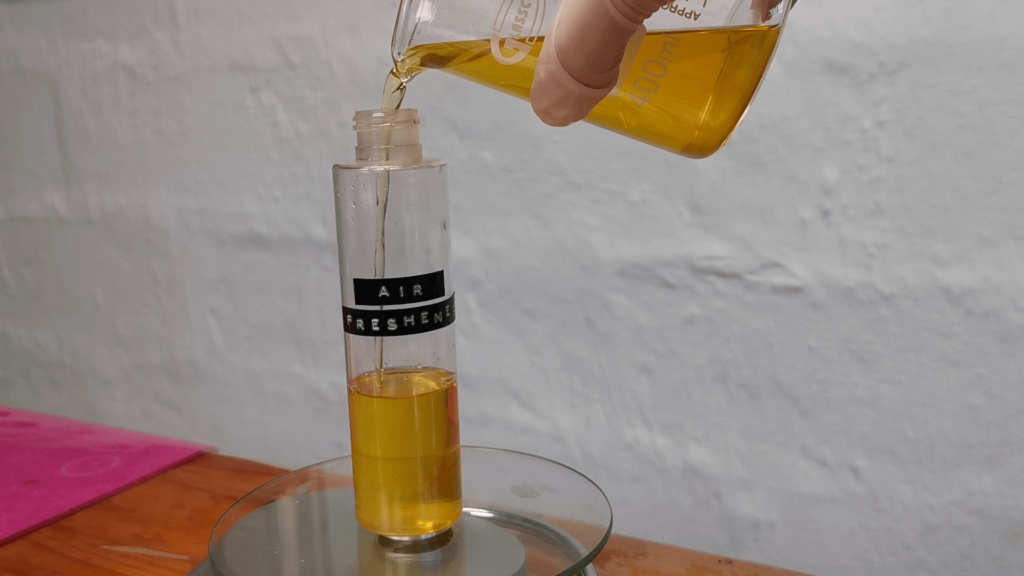
Notes
- You can use the peels and juice from any citrus fruits (fresh or dried). A combination of citrus works best. I personally used a blend of dried lime and fresh ruby grapefruit peels from my garden, as well as a blend of lemon and orange juice for the tincture.
- You can use one citrus essential oil, or a blend of different citrus essential oils. Use what you have access to. I personally use a blend of equal parts sweet orange, grapefruit, lemon, mandarin and tangerine essential oils (0.5g of each).
- Avoid using plastic utensils and containers for this recipe, because both alcohol and the essential oils will degrade it. You will have damaged equipment, and you’ll be spraying micro plastics into the air. You can use glass, coated ceramic and stainless steel.
- I usually make and store separate large batches of the citrus tincture and fragrance blend (triple the recipe), so that I can just mix this up in 5 minutes. To avoid waste, this recipe just makes enough for one batch just in case you don’t like the fragrance. If you love it, then I suggest also making a larger batch of the tincture and fragrance blend for a much quicker process in future.
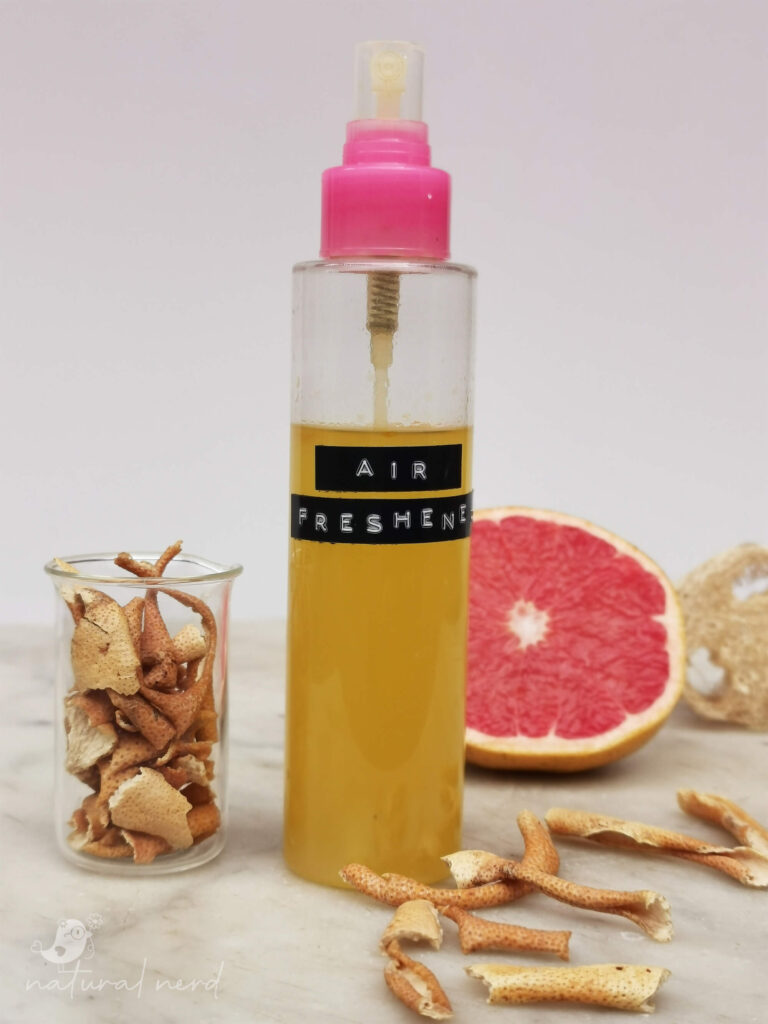
Substitutions
The foundation of this recipe combines a tincture, fragrance blend and distilled water. You can replace everything, except the high-proof alcohol (min. 95%). Just keep the quantities of my recipe the same, and it will still be self-preserving. You can use any essential oils for the fragrance blend. You can make a homemade tincture with any clean botanical. You can use a hydrosol instead of distilled water (eg. rose water). You can use vanilla extract instead of vanilla absolute oil. This recipe allows you the flexibility to be creative – you can basically create your own fragrance and tincture combination. Obviously, you won’t have a “citrus burst” room spray, but your own invention instead.
Alcohol Substitutions
You can use another high-proof alcohol like perfumer’s alcohol, or Royal Pure Vodka 96% (which is so expensive!), isopropyl alcohol (which is not natural) or Everclear (which is not available in South Africa). You cannot use rubbing alcohol, because it has a strong fragrance that will overpower anything. You cannot use consumable spirit alcohols like vodka with this particular recipe. If you want to use a low-proof alcohol like vodka (45%), you’re going to have to include a preservative and solubiliser as well, and that just makes things complicated. If you want the simplest method with the fewest ingredients, then the high-proof alcohol is necessary. Only high-proof alcohol can preserve the product, and only high-proof alcohol can solubilise essential oils to prevent separated layers. This formula has been carefully calculated to contain over 65% alcohol, which effectively makes it a self-preserving product.
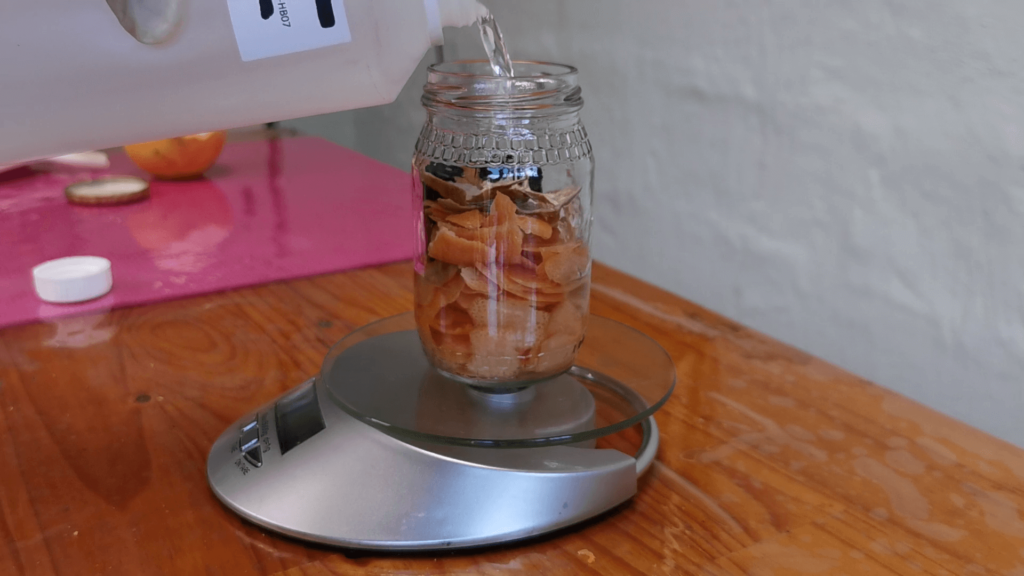
Cost & Shelf Life
Cost price: The cost can vary greatly depending on the essential oils you use and the price of your ethanol. The cheapest that I can get this recipe to is R28 per 100g if you use citrus from your garden, vanilla extract, sweet orange essential oil and standard ethanol. The price can shoot up to R87 per 100g if you use perfumer’s alcohol, vanilla absolute and more pricey citrus oils like mandarin. This is based on the retail prices of ingredients at the time of writing in 2022.
Lasted me about: 2 months as a bathroom spray in a household of two.
Shelf life: 1 year if stored in glass, away from direct sunlight, and made with sterilised equipment & packaging.
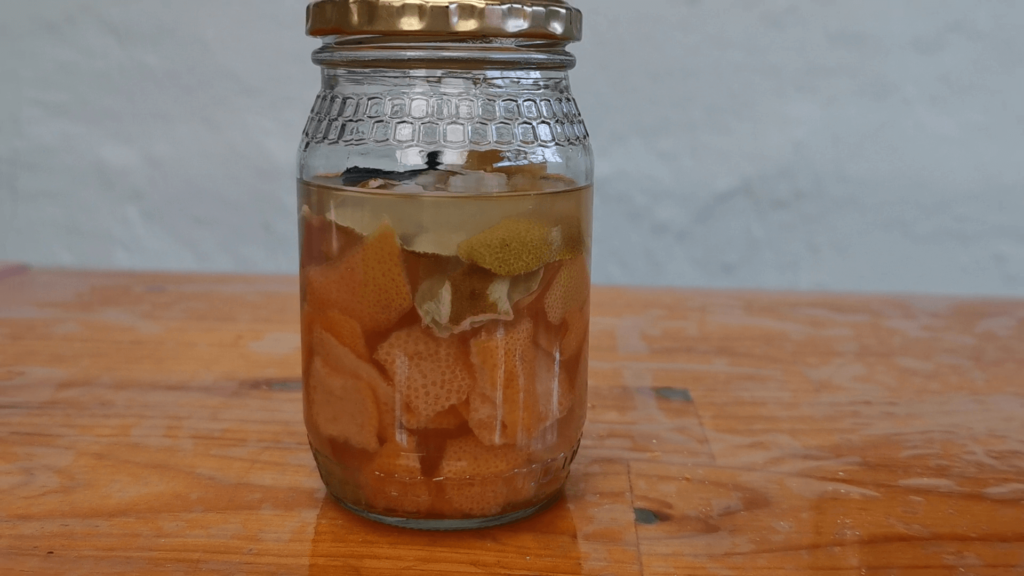
Challenge
- Time to make extracts: This recipe requires you to make the tincture and fragrance blend first, instead of just mixing ready-made ingredients. You will need 1 week for the tincture, plus an extra hour while you wait for the fragrance blend. This is what making stuff from scratch is all about!
- Alcohol-based fragrance is not for everyone: It can irritate your lungs, especially if you have respiratory problems like asthma. Everyone should avoid inhaling the mist directly. I usually spray my bathroom towels and curtains.
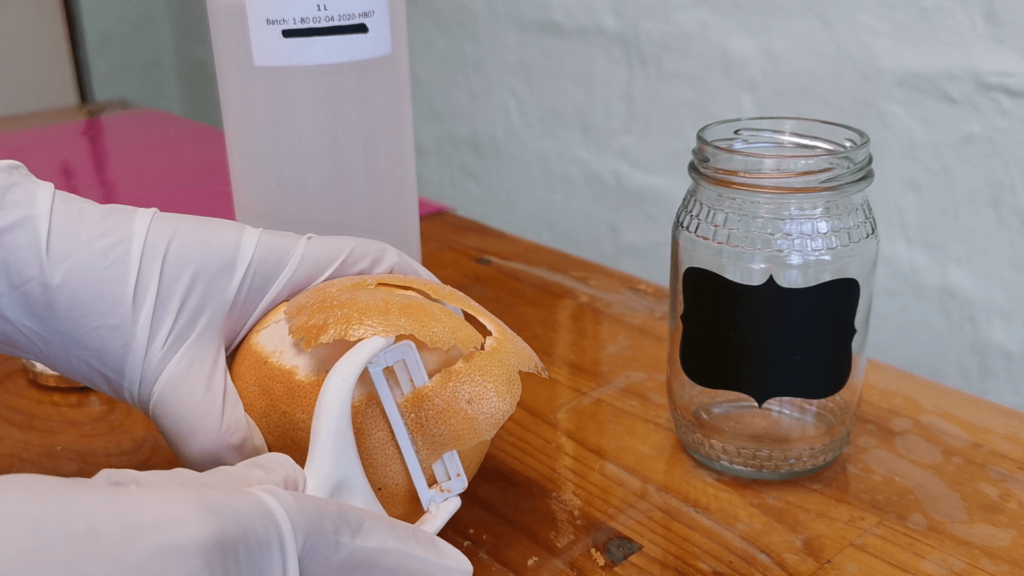
Cherry on Top
- The high alcohol content also disinfects the air. Perfect for a bathroom!
- Plant-based & vegan recipe. Even the ethanol that I have is made from sugar cane.
- Preservative-free.
- No aerosols.
- Simplest method & ingredients.
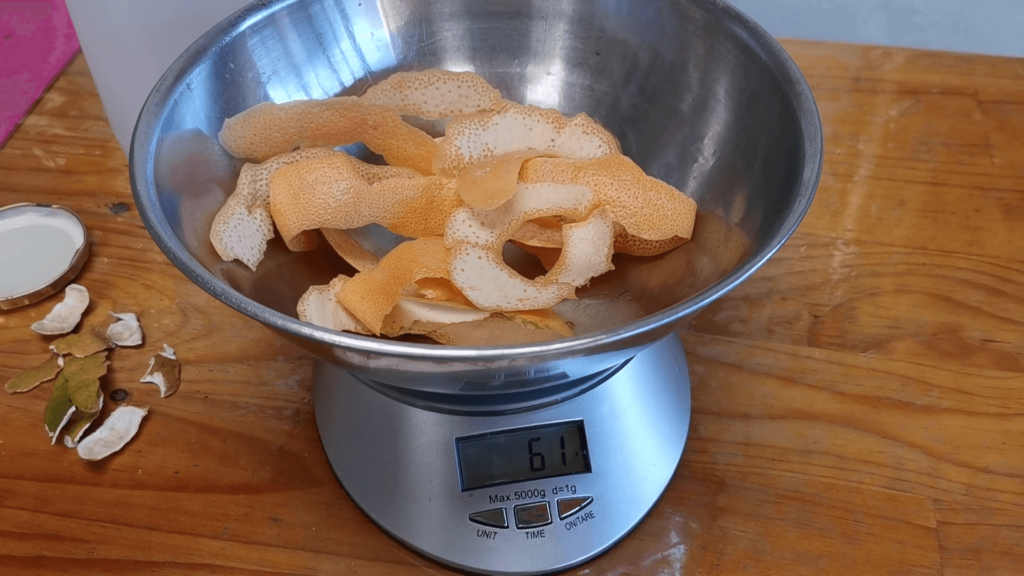
Ingredient Information
- Ethanol 95%: is a pure natural alcohol which acts as the solvent, disinfectant, preservative and solubiliser in this recipe. (buy here)
- Distilled water: is a purified, pharmaceutical grade of water that contributes to a longer shelf life of your product. Since pure ethanol evaporates quickly, the distilled water in this recipe delays evaporation for longer lasting fragrance. (buy here)
- Citrus essential oils: provide the bulk of the natural fragrance in this recipe. (buy here)
- Citrus peels: contain essential oils, but don’t impart much fragrance in the tincture. It is their carotene content that provides the beautiful orange colour of this air freshener.
- Vanilla absolute: lends a sweet base note to balance out the zesty citrus top notes. (buy here)
- Citrus juice: contains more “flavour” than citrus peels, so a tiny amount is added to impart a mild citrus fragrance to the tincture.
Recommended Retail Option
If you don’t want to make it yourself, then consider buying Nu-Eco Citrus Burst Air Freshener. Based on the ingredient list alone, this is the closest natural product to my recipe in South Africa. It contains ethanol alcohol, distilled water and citrus essential oils with a dash of vetiver (instead of vanilla). The reviews are positive too.
Precautions
I better just mention a few words of warning for those who are unfamiliar with working with alcohol. High purity alcohols, including natural alcohol like ethanol is toxic when ingested. Most pure alcohols that you buy are also denatured to discourage consumption (i.e. made poisonous to consume). Please avoid this product if you have young children at home who may accidentally ingest it. Avoid inhaling the vapours directly. Rather spray away from yourself and also onto fabrics. The high alcohol content may irritate people who already have respiratory problems like asthma etc. Do not apply this product to your skin as a body spray or perfume. It has been formulated as a room spray, and will irritate / damage your skin if applied topically. The citrus essential oils are also photo-toxic, which makes them unsuitable for topical use. Please remember that alcohol is highly flammable! Keep this product away from your kitchen, flames, candles, heaters, electrical outlets etc.
Did you follow this recipe exactly, or did you make some creative substitutions? Let me know in the comments below.

